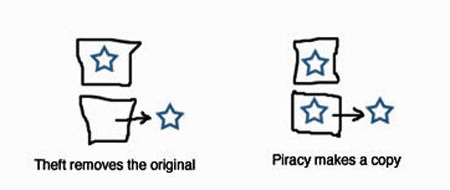 A few years ago best-selling author Paulo Coelho made a Russian translation of The Alchemist available without permission from his publisher. As a result the sales in Russia skyrocketed from 1,000 books a year to over 1,000,000.
A few years ago best-selling author Paulo Coelho made a Russian translation of The Alchemist available without permission from his publisher. As a result the sales in Russia skyrocketed from 1,000 books a year to over 1,000,000.
The above is just one of the many examples which show that there are many positive sides to the act of ‘copying’. Despite these nuances, piracy is often referred to as theft. This is a problem according to Stefan Larsson, lawyer and socio-legal researcher at Lund University in Sweden.
Larsson addresses the issue in his thesis “Metaphors and Norms – Understanding Copyright Law in a Digital Society,” for which he just received his doctorate. Talking to TorrentFreak, he explains why copyright infringement isn’t theft, and how this problematic metaphor keeps the gap between public norms and the law intact.
“The theft-metaphor is problematic in the sense that a key element of stealing is that the one stolen from loses the object, which is not the case in file sharing since it is copied. There is no loss when something is copied, or the loss is radically different from losing something like your bike,” Larsson explains.
One of the obvious problems is that it suggests that every “stolen copy” is a lost sale.
“Following this conception, some iPods could be valued at millions of dollars and a file sharing service could aid in copyright infringements representing more value than the Gross Domestic Product of entire countries,” Larsson says.
And indeed, if we look at the court case against The Pirate Bay in Sweden, the renumeration model of the entertainment industry would mistakenly put the “value” of the site at billions of dollars.
Piracy vs. Theft

“I think that one important aspect lies in that the legal regulation is built on fundamentally different conceptions of reality,” Larsson told TorrentFreak.
The researcher explains that the public perception of the law, or social norms, is out of line with what the law actually says. In part this is because the “theft” metaphor is built into law, while there is no such thing as theft where piracy is concerned.
“In other words, this means that legal concepts can become metaphorical if their meaning expands into new areas, and the fixed conceptions that once ensured their legitimacy may seem unjust in the eyes of a reality that has moved on. This supports the gap between legal and social norms regarding parts of copyright today.”
This gap between the law and what people see, feel and experience in real life is a problem, one that lawmakers are now trying to address with even more draconian laws based on the same nonsense metaphors.
But are tougher laws the best solution? Will these change people’s norms? Larsson is not convinced.
“There are naturally many examples of when tougher laws change behavior, and there are also even examples of when tougher laws have made a substantial contribution in changing social norms. However, there are a few possible drawbacks when law turns repressive.”
He explains that these laws “would need to make everyone think differently about reality,” something that’s easier said than done. Another problem according to Larsson is that may people will simply find ways to hide what they do, such as using VPN services or proxies when downloading via BitTorrent.
Larsson doesn’t think that the current trends of stronger copyright laws and more surveillance of Internet users is the right path to take. These measures often violate the rights of the masses to benefit the interests of a few, which can never be a good solution.
Instead of changing people’s norms and twisting reality, perhaps society might be better off when copyright law adapts to the digital age?





